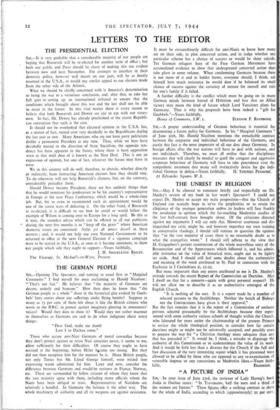THE UNREST IN RELIGION
SIR,—May I be allowed to comment briefly and respectfully on Dr. Mozley's review of my book in last week's Spectator? I could not expect Dr. Mozley to accept my main proposition—that the Church of England can scarcely hope to soave the perplexities or to retain .the allegiance of the younger generation unless its leaders will face frankly the revolution in opinion which the far-reaching Modernist studies of the last half-century have brought about. Of the criticisms directed against my arguments I will say only this. However courteous and dis- tinguished my critic might be, and ho,wever imperfect my own training in conservative theology; I should still venture to question the opinion that " in the vast majority of cases there is no reasonable doubt as to what the evangelists wrote." I should still adhere to the view that M. Guignebert's patient examination of the whole marvellous story of the Resurrection and of the Appearances which followed it, and his admir- able insistence on the value of historical tests, ought not to be lightly set aside. And I should still feel some doubts about the authenticity and meaning of the word attributed to St. Paul in connexion with the Eucharist in I Corinthians xi, 23-25.
But more important than any errors attributed to me is Dr. Mozley's attitude towards the recent Report of the Commission on Doctrine. May I dwell on that for a moment—again with great personal respect? He will not allow me to describe it as an authoritative utterance of the English Church.
It is nothing of the sort. It is a report made by a number of selected persons to the Archbishops. Neither the bench of Bishops nor the Convocations have given it their approval."
But the fact remains that it is the report of a Commission of eminent persons selected presumably by the Archbishops because they repre- sented with some authority various schools of thought within the Church, who laboured for years under the chairmanship of the present Primate
to review the whole theological position, to consider how far certain doctrines might or might not be universally accepted, and possibly even to prepare the way for " a Christian theology more adequate than any that has preceded it." It would be, I think, a mistake to disparage the authority of this Commission or to underestimate the value of its work.
And it would be little less than a disaster for the Church if the full and
free discussion of the very interesting report which it has presented were allowed to be stifled by those who are opposed to any re-examination of venerable dogmas or any concessions to Modernist ideas.—Yours faith-


























 Previous page
Previous page